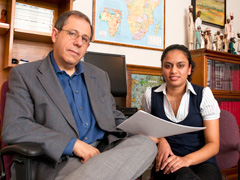Model Behaviour
By Alisa Kim
When Nadine Akbar was contemplating a career in medical research and looking for an academic mentor, she didn't have to look very far: she was already working for him.
Akbar is a first-year master's student at the University of Toronto's Institute of Medical Science. Her supervisor is Dr. Anthony Feinstein, an imaging scientist in the brain sciences research program at Sunnybrook Research Institute, and a professor at U of T. After graduating with a psychology degree in 2007, Akbar was deciding between going to medical school and doing graduate work in either psychology or neuroscience. She spent a year assisting Feinstein with his research on multiple sclerosis (MS) to find direction.
"I knew I wanted to go back to school," says Akbar. "The year off was to get more exposure, more experience—to see what it was I wanted to do. Working with Dr. Feinstein solidified my research interest in MS and led me to pursue graduate studies with him."
A passion for research is one of the qualities Feinstein looks for in a trainee. He advises students who are looking for a mentor to do some soul-searching before pursuing a career in science. "If you don't have enthusiasm and a real desire to do research, it will be very hard for you. You need to have a personal conviction that what you're doing is important—that it's what you want."
For her thesis, Akbar is working with Feinstein to develop an online cognitive testing program for MS patients. During their weekly meetings Feinstein explains research methods and helps Akbar work through problems she encounters in her research. He also presents her with opportunities to attend conferences and publish her work.
In addition to imparting practical knowledge such as how to write for journals, Feinstein's goal is to nurture self-motivated and independent thinkers. His approach to mentoring is to supervise students closely early on, and allow them to take ownership of their projects as their skills improve and they gain more confidence.
Now that she is Feinstein's apprentice—as opposed to his employee—Akbar has felt this nudge toward intellectual independence. "When I was his research assistant, it was more of a job and him telling me what to do," she says. "Now I have to direct my own research and write. It's my project now. Eventually I'm the one who has to defend [my work]."
Feinstein's expectations of his students are high, but he is not rigid. While he anticipates that his students will be the lead authors on any publications that arise from their research, he also understands that sometimes things don't always go as planned. Open communication is therefore a critical component of mentoring. "Students have to be very comfortable with their mentor," he says. "There should be a line of communication with the mentor [such] that if the project is not working out, it won't be pursued. There should be some flexibility to change course."
Akbar—whose goal is to complete a PhD and become a medical scientist—can appreciate the importance of flexibility. "I actually wanted to go to med school," she says. "It was only because of my exposure to the research here that I decided to do a master's."
PDF / View full media release »




